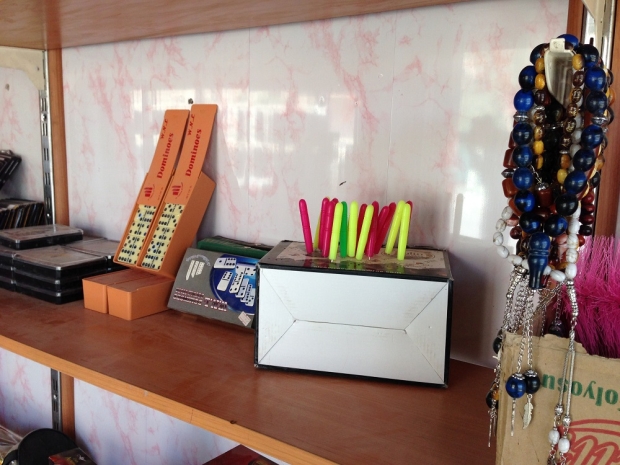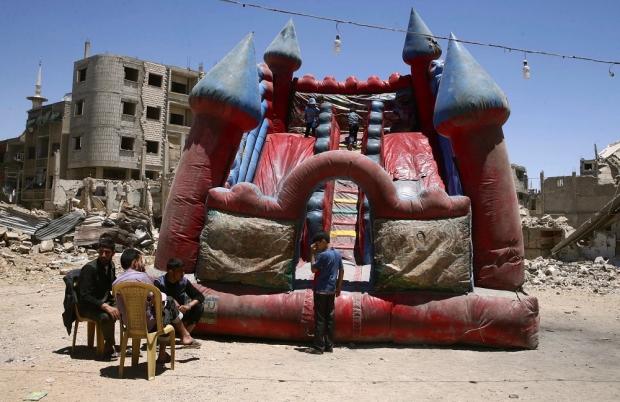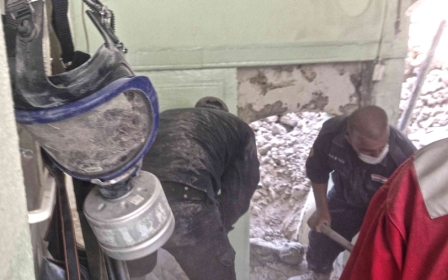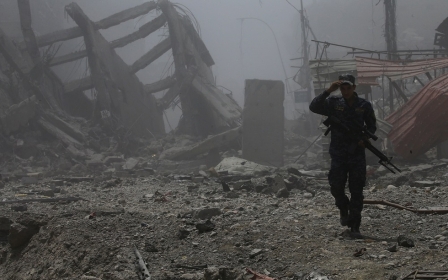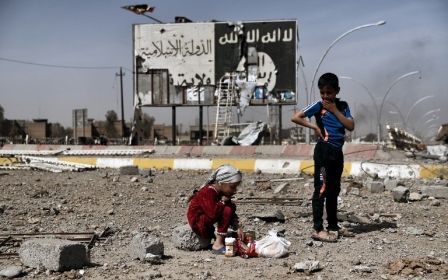Forbidden pleasures: Inside the Mosul shop selling everything IS banned
MOSUL, Iraq - In a small shop in a corner of west Mosul, 16-year-old Abdel Halek dusts his shelves and admires the trove of goods he can now sell without fear of punishment by Islamic State.
Mobile phone accessories, playing cards, dominoes, prayer beads - all were banned by Islamic State, and all now sit proudly on Abdel's shelves.
The smoke from daily air strikes is gone in his al-Jadida suburb, where fighting was fierce and more than 100 civilians were killed in a single coalition air strike, and is now replaced with construction dust as resilient locals try to clear debris and rebuild ruined lives, shops and homes.
Post-IS, clouds also rise once again from groups of men sat round shisha pipes. Such an indulgence, while highly addictive and dangerous for health, is one of the rediscovered freedoms Mosul residents have enjoyed since liberation.
When Daesh was in control you couldn't get any of this stuff, only now
- Abdel Halek, Mosul shopkeeper
"When Daesh [Islamic State] was in control, you couldn't get any of this stuff, only now," Abdel said, grinning and gesturing around his corner shop, where the biggest-selling item is shisha pipes.
The pipes line the windows and a shelf running along the back wall, beneath which are accessories and boxes of flavoured shisha tobacco.
At a second shop nearby, a taxi driver tolds how he was publicly lashed twice for smoking, but he could not kick the habit.
A 15-year-old boy told how he and his father were thrown into an IS jail for selling cigarettes and heard from their cell other prisoners being tortured. They also witnessed one man being burned to death.
Despite this, they continued to sell their wares as the family had no other way of making money.
Under IS, Mosul's smokers not only faced public lashings but black market prices. A box of shisha tobacco cost 16,000 dinars ($13.71) under IS, reflecting the risks and even harsher penalties faced by those who dared to trade. Abdel now sells the same boxes for the equivalent of about 85 US cents.
Everyday 'evils'
Abdel's other shelves carry items also banned by IS - there is a small wooden stand upon which hang colourful prayer beads, a popular religious accessory across the Middle East.
"One day I was walking down the street with my beads and a Daesh guy stopped me and told me they were haram [forbidden]," said Abdel.
"He said if he ever saw me with them again, he would beat me around the head, so I never carried them again," he added, shaking his head with disbelief that an item intended to encourage prayer was banned.
Beside the prayer beads are carefully arranged boxes of dominoes and sets of playing cards.
When IS took control of Mosul, residents were confused about what was acceptable under IS tyranny. Many continued with their normal hobbies until they discovered they had been banned.
Abdel's brother was found playing dominoes by the River Tigris by an IS fighter who told him the activity was forbidden, lectured him and then threw his dominoes into the river.
"Life under Daesh was so boring because everything was banned," Abdel said, rolling his eyes. "You couldn't do anything because you always risked being caught and punished. We wanted to go out but we were scared."
Like many of his friends, Abdel spent most of the three years staying at home and trying to keep below IS's radar, avoiding either getting into trouble or being recruited by the group.
"One day a Moroccan IS member stopped me and said: 'You're a good age, you should come and join us'. But I told him my father wouldn't let me, and ran away and hid," said Abdel.
A few weeks later, the same IS fighter spotted him again and complained that recruitment of locals was proving challenging.
"He asked me: 'Why does nobody want to do jihad? Why does everybody hide in their houses?' But I just put my head down and stared at the ground and he tutted and walked away," said Abdel.
Daesh killed literally thousands of people. It became like public entertainment.
- Abdel Halek
After that incident, he left the house only if it was absolutely essential.
These years of tedium under IS prompted a handful of Abdel's friends to join the group.
"One of my friends joined because he wanted to carry a gun and act like Rambo and show off to everyone," he said, adding that his friend's $50 monthly wage in no way compensated for a life of killing and violence.
And that life proved to be short. The boy, along with other IS members, was killed by an air strike while they were eating breakfast in a west Mosul suburb, according to a relative.
Abdel's memories of life under IS are dark. "Daesh killed literally thousands of people in Mosul, in all different ways, with daggers, with tanks, with anything. They killed them like it was entertainment," he said.
"People got accustomed to it, and it became like public entertainment.
"Many locals used to go and watch executions. I didn't like to, but sometimes you couldn't help seeing them, like when Daesh put televisions in the streets and played videos of local executions and made passersby watch."
Mobile business
Hundreds of civilians were also killed during the battle to liberate al-Jadida, from which Abdel's family fled for a month during the worst fighting.
"Air strikes and Daesh snipers killed a lot of people and many buildings collapsed," he said, gesturing towards several crumpled buildings across the street.
The US admitted in May that a 17 March air strike targeting two IS fighters killed at least 105 civilians sheltering beneath the house. Locals claim reliance on air strikes in the Mosul conflict killed countless more.
Outside the shop, Abdel has set up a table selling mobile phone accessories - colourful covers, headphones and screen protectors. Under IS, mobiles were forbidden, and those found with even a SIM card were often executed for "spying".
As he searched for a screen-protector for a customer, Abdel speculated about the future.
"I think I'd like to be a doctor, but maybe I will join the army," he said.
"I'd like to go back to school, but only a few schools have managed to reopen, and they are so oversubscribed, with 65 students in each class, I thought it would be better to wait and focus on my business instead."
While they try to piece their lives back together, Mosul residents' biggest fear is the terrifying prospect of IS somehow retaking control.
Abdel said his family members each keeps a small bag packed, ready to flee again if they hear even a rumour that IS forces are returning.
This article is available in French on Middle East Eye French edition.
New MEE newsletter: Jerusalem Dispatch
Sign up to get the latest insights and analysis on Israel-Palestine, alongside Turkey Unpacked and other MEE newsletters
Middle East Eye delivers independent and unrivalled coverage and analysis of the Middle East, North Africa and beyond. To learn more about republishing this content and the associated fees, please fill out this form. More about MEE can be found here.


